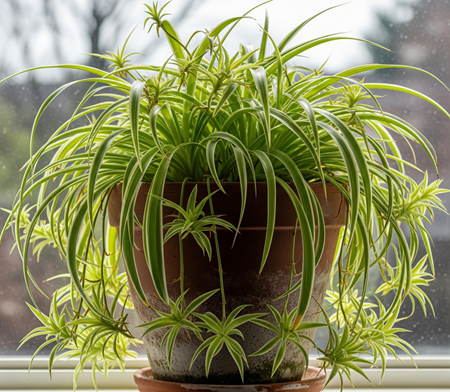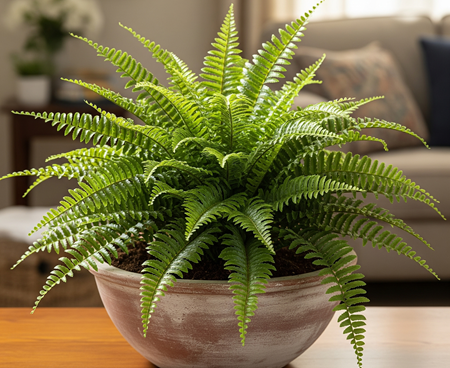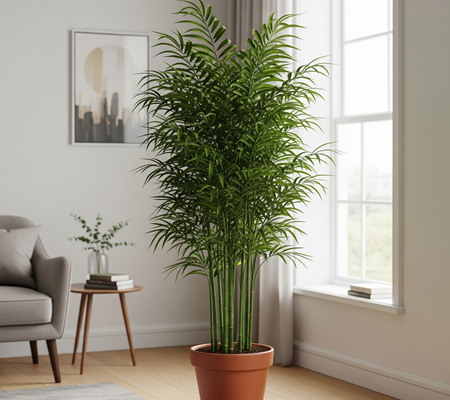If you’re looking for some easy-care indoor plants that are also dog-friendly, look no further. In this article, we will cover three great options that are safe for your dog.
So, without further ado, let’s get started.
1. Spider Plant

All parts of the spider plant are non-toxic to dogs, including the leaves, stems, and flowers. However, as with any plant, it is important to supervise your dog around spider plants to prevent them from chewing on the leaves or stems, which could cause an upset stomach.
If your dog does ingest spider plant leaves or stems, they may experience gastrointestinal upset including vomiting and diarrhea. In most cases, these symptoms are mild and resolved within 24 hours. However, if your dog is showing signs of severe distress, such as prolonged vomiting or diarrhea, lethargy, or loss of appetite, it is important to contact your veterinarian right away.
2. Boston Fern

Boston ferns (Nephrolepis exaltata) are popular houseplants because they are attractive and easy to care for. However, some people are concerned that Boston ferns may be unsafe for dogs. The main concern with Boston ferns and dogs is that the ferns may contain a toxic chemical called saponin. Saponin is found in many plants and is generally considered to be safe for humans. However, some dogs may be allergic to saponin, and it can cause stomach upset if ingested in large quantities.
While Boston ferns are generally safe for dogs, it is important to be aware of the potential risks. If you have any concerns, it is best to err on the side of caution and keep the fern out of reach of your dog.

3. Bamboo Palm
Bamboo palm (Chamaedorea seifrizii) is a species of palm tree in the family Arecaceae, native to Mexico and Central America. It is a popular houseplant in temperate regions. The bamboo palm is safe for dogs, as it is non-toxic to them. This plant is a great addition to any home with dogs, as it can help to purify the air.
The bamboo palm does best in bright, indirect light and well-drained soil. It is important to keep the soil moist, but not wet, as too much water can lead to root rot.
How To Care for These Indoor Plants
Don’t Overthink It
When it comes to low-maintenance plants, the key is not to overthink it. These plants are easy to care for because they don’t require a lot of attention. So, don’t stress out if you forget to water them or if they don’t get as much light as they could. Just relax and enjoy your plants.
Water When the Soil is Dry
One of the biggest mistakes people make when caring for plants is overwatering. This is especially true for low-maintenance plants. These plants don’t need a lot of water, so only water them when the soil is dry. If you’re not sure if the soil is dry, stick your finger in it. If it’s dry to the touch, then it’s time to water.
Don’t Fertilize
Fertilizing is not necessary for low-maintenance plants. In fact, it can actually do more harm than good. If you do decide to fertilize, use a very diluted solution, and don’t do it more than once a month.
Choose the Right Pot
When it comes to pots, you don’t need to spend a lot of money. In fact, it’s better to choose a pot that’s a little too big rather than a little too small. A pot that’s too small will restrict the plant’s roots, which can lead to problems. A pot that’s too big, on the other hand, will require more water and fertilizer.
Don’t Worry About Pests
Pests are not a big problem with low-maintenance plants. In fact, most of these plants are resistant to pests. So, if you do see a pest on your plant, don’t worry. Just remove it and throw it away. Following these simple tips will help you keep your low-maintenance plants healthy and happy. Just remember to relax and enjoy your plants.
Bonus Tip
Choose plants that are known to be low-maintenance and dog-friendly. Some good options include spider plants, and Boston ferns. Avoid plants that are poisonous to dogs, such as Peace Lilies, Aloe Vera, and Philodendrons.
Frequently Asked Questions
What are some low-maintenance, indoor plants that are also safe for dogs?
There are several low-maintenance, indoor plants that are safe for dogs. Some of the most popular options include spider plants, rubber plants and Boston ferns.
How can I tell if a plant is safe for my dog?
If you’re unsure whether a plant is safe for your dog, the best thing to do is to consult with a veterinarian or professional plant expert. They will be able to give you specific guidance based on your dog’s individual health and safety needs.
What should I do if my dog eats a plant that is not safe for them?
If your dog eats a plant that is not safe for them, it is important to seek professional medical help immediately. Call your veterinarian or take your dog to the nearest emergency animal hospital.
What are some general tips for keeping my dog safe around plants?
First, make sure to keep any poisonous plants out of reach of your dog. Second, keep an eye on your dog when they are around plants, and be sure to remove any plant debris that they may have brought inside. Finally, if you have any questions or concerns, be sure to consult with a professional.
Conclusion
If you’re looking for some easy-care indoor plants that are also dog-friendly, here are three great options to consider. From low-maintenance succulents to hardy ferns, these plants can thrive in a variety of indoor environments and won’t harm your furry friend if they take a nibble. So, if you’re looking to add a little greenery to your home without worrying about your dog’s safety, be sure to check out these three plants.
Michelle Wilde is a stay-at-home mom and avid plant lover. Armed with a postgraduate degree in Computer Science (no kidding!), she loves researching plants and landscapes. When she is not caring for her 4 kids, she spends time on her passion for plants. She blogs at The Indoor Plants Channel, the trusted source for indoor plants.


Comment here